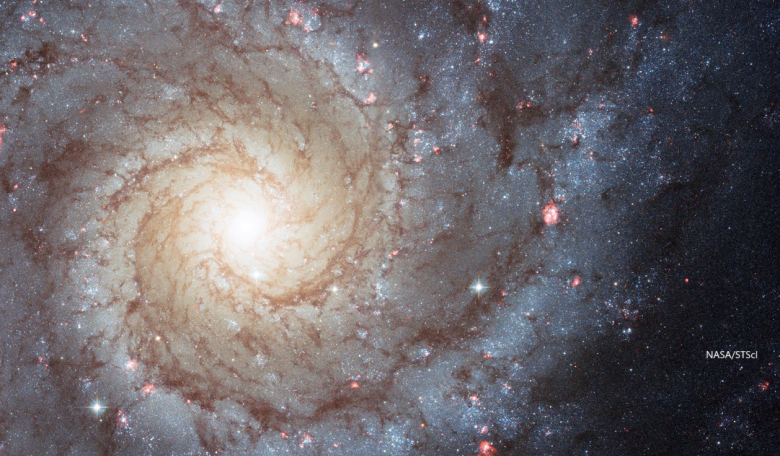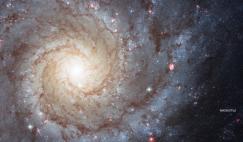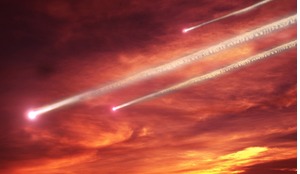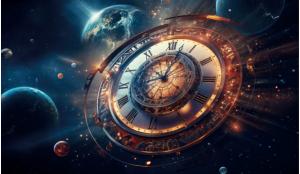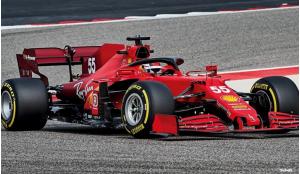The cosmos has long served as a canvas for humanity’s dreams, fears and ambitions. Every culture has projected its own narratives onto the stars, crafting mythologies that reflect not only their scientific understanding but also their social and philosophical values. Ariadne Gallardo Figueroa delves into a fascinating new study, where something calls each of us to identify with what we have culturally constructed as humanity.
Mythologies of Outer Space, a new book edited by Jim Ellis and Noreen Humble, takes an interdisciplinary approach to exploring the cultural, historical, and ethical dimensions of space exploration. Drawing from astronomy, science fiction, Indigenous perspectives, and the arts, the book presents a compelling discussion on how we have imagined space – and how those visions continue to shape our actions beyond Earth.
This collection originated from the Calgary Institute for the Humanities’ 42nd annual Community Seminar, titled ‘The Last Frontier: Mythologies of Outer Space’. The seminar, shaped by the CIH Advisory Board – including Heather Bourne, Ron Bond, Jackie Flanagan, David Holub, Amanda Koyama, Tony Luppino, Jim McNeil, Naomi Potter, and Nancy Tousley – provided the foundation for this thought-provoking book. The editors acknowledge the University of Calgary’s location on the traditional territories of the Treaty 7 First Peoples and the home of the Métis Nation of Alberta, Districts 5 and 6, which informs a broader perspective on humanity’s relationship with the cosmos.
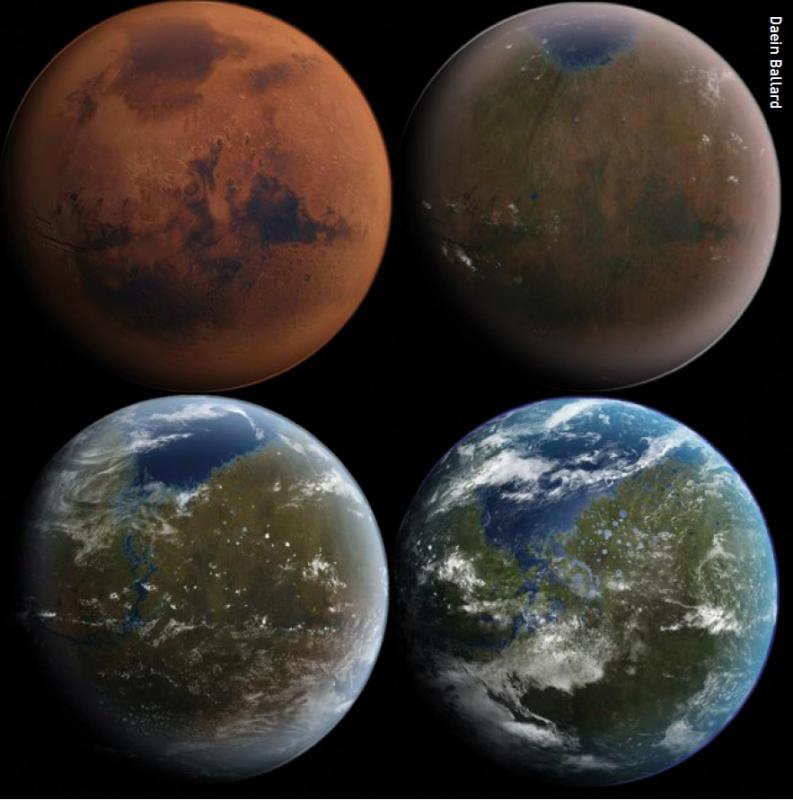 Artist’s impression of a terraformed Mars. Terraforming narratives from early 20th century science fiction evolved alongside environmental movements and shifting political ideologies on Earth.
Artist’s impression of a terraformed Mars. Terraforming narratives from early 20th century science fiction evolved alongside environmental movements and shifting political ideologies on Earth.
Shifting narratives
How we perceive space depends largely on our cultural positioning
One of the book’s central arguments is that how we perceive space depends largely on our cultural positioning. Jim Ellis, in the introduction, highlights how life has always existed in the human imagination of the cosmos – whether through myths of lunar deities, celestial afterlives, or extraterrestrial beings.
This perspective is further explored through Afronauts, a short film depicting Zambia’s 1960s space programme, which, while often dismissed as absurd, may have been a sharp political critique of Cold War-era space ambitions. The film reflects a deeper human tendency to see the cosmos as a domain of symbolic and ideological struggle.
Noreen Humble expands on this theme in Imaginary Voyages to the Moon: Lucian and His Legacy, where she examines the earliest fictional accounts of lunar travel, including Lucian of Samosata’s True History. Through this lens, she reveals how space exploration narratives have long been interwoven with themes of conquest and discovery, setting a precedent for later Western colonial expansion into space.
Reimagining the Moon
Alice Gorman’s chapter, How We Let the Moon Die, and Why It Isn’t Dead, critiques the dominant Western narrative that portrays the Moon as lifeless and inert. This framing, she argues, justifies its exploitation as a commercial and geopolitical resource rather than as a site of historical and cultural significance.
To give us a broad perspective, the author points out the way in which various countries have planned how to arrive and settle in the icy lunar landscapes and take advantage of what they can extract from them. Beyond the extraction of ice as a means of life support, minerals are highly prized, a remedy for their constant exploitation and depletion on Earth.
Gorman contrasts this perspective with Indigenous worldviews that see celestial bodies as interconnected with life on Earth. She also reflects on the ironic relationship between space law and masculine power structures that have historically dictated lunar exploration, underscoring the increasing role of private capital in shaping its future.
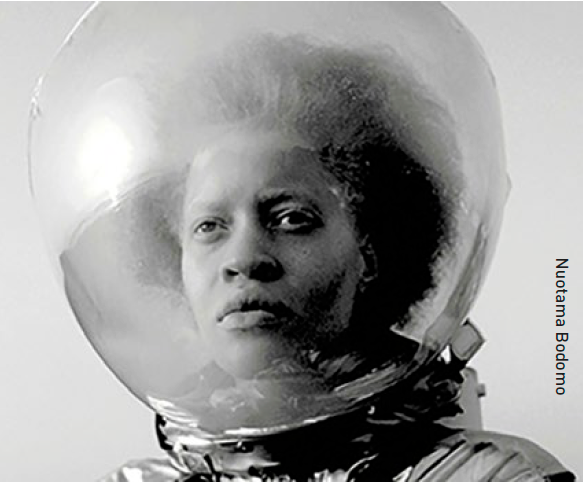 Afronauts, a 2014 short film by Ghanaian-born filmmaker Nuotama Bodomo, was inspired by the Zambian space programme in the 1960s. It follows the then 17-year-old astronaut Matha Mwamba, as she prepares for this historic mission and addresses themes of colonialism, nationalism, and Afrofuturism, an aesthetic and philosophy that explores African diasporic culture and technology.
Afronauts, a 2014 short film by Ghanaian-born filmmaker Nuotama Bodomo, was inspired by the Zambian space programme in the 1960s. It follows the then 17-year-old astronaut Matha Mwamba, as she prepares for this historic mission and addresses themes of colonialism, nationalism, and Afrofuturism, an aesthetic and philosophy that explores African diasporic culture and technology.
Astro-colonialism
Hilding Neilson, an Indigenous astronomer, contributes a critical examination of how colonialist ideologies persist in modern astronomy and space policy. In Space is Part of the Land: Reconsidering the Relationships Between Astronomy Research, Outer Space Exploration, and Colonialism, Neilson challenges the Western commodification of space, arguing that Indigenous perspectives offer alternative ways of understanding the cosmos. He critiques the historical disregard for Indigenous lands in scientific ventures, such as the construction of telescopes on Mauna Kea, and highlights how Indigenous knowledge can enrich modern space governance.
He concludes by questioning the kind of relationship humanity seeks with outer space, the Moon, Mars and beyond. Such relationships are often defined by the rich and powerful who view Earth as a resource and something to exploit. “Let us support cultural revitalisation and fostering nation-to-nation relations based on treaties,” he states.
A mirror to space ethics
Space exploration narratives have long been interwoven with themes of conquest and discovery, setting a precedent for later Western colonial expansion into space
Chris Pak’s Terraforming and Analogy in Science Fiction explores how speculative fiction has long engaged with the ethics of transforming alien worlds. He traces the origins of terraforming narratives from the early 20th century, focusing on how they evolved alongside environmental movements and shifting political ideologies.
Pak critiques contemporary enthusiasm for space colonisation – particularly among tech entrepreneurs like Elon Musk – who frame interplanetary settlement as a solution to Earth’s environmental crises without addressing the underlying causes of planetary destruction.
Stefania Forlini’s discussion of the Gibson Collection of Speculative Fiction further illuminates how science fiction has historically reflected humanity’s changing attitudes toward the cosmos. She highlights forgotten works that challenge mainstream narratives, revealing alternative visions of space travel that prioritise cooperation over conquest.
In an interesting final reflection, Forlini exclaims: “Every new way of understanding the world must confront and transform itself from previous methods; a disorderly process similar to mutation and transformation into something unforeseen, but dependent on what came before.”
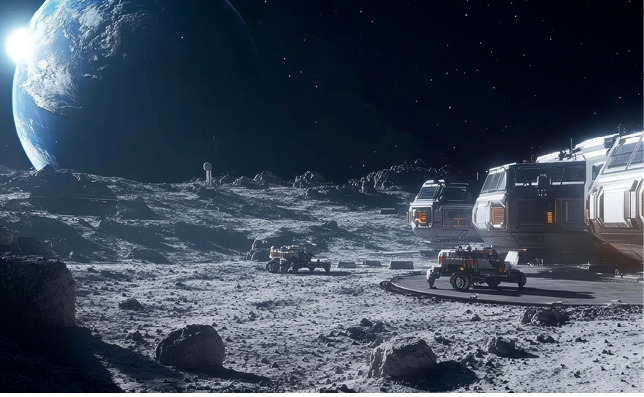 Alice Gorman argues that the dominant Western narrative justifies its exploitation of the Moon as a commercial and geopolitical resource rather than as a site of historical and cultural significance. Beyond the extraction of ice as a means of life support, minerals are highly prized, a remedy for their constant exploitation and depletion on Earth.
Alice Gorman argues that the dominant Western narrative justifies its exploitation of the Moon as a commercial and geopolitical resource rather than as a site of historical and cultural significance. Beyond the extraction of ice as a means of life support, minerals are highly prized, a remedy for their constant exploitation and depletion on Earth.
Imagining outer space
The book also features contributions from visual artists and poets who reframe space exploration through an aesthetic and philosophical lens. Photographer Dianne Bos, for instance, explores how pinhole photography can evoke the vastness of the cosmos in her Galaxy Series. Similarly, David Hoffos’ You Will Remember When You Need to Know immerses viewers in dreamlike depictions of alien encounters, blurring the boundaries between inner and outer space.
Naomi Potter’s interview with Elyse Longair delves into how collage art reconstructs space imagery to challenge conventional perceptions of celestial landscapes. These artistic explorations reinforce the book’s central thesis: that space is not merely a physical domain but a cultural and ideological construct shaped by historical and contemporary narratives.
Balancing progress with ethics
Canadian astronaut Robert Thirsk, in his afterword, provides a poignant reflection on the future of space governance.
“I have enjoyed a privileged career as an astronaut,” he writes, “living and working in space for over two hundred days aboard three different spacecraft, fulfilling a childhood dream. My career involved the exploration of both space and self, giving rise to my physical, mental and emotional limits.
Thirsk warns against the unchecked commercialisation of space, questioning whether private companies will respect its environmental and ethical dimensions. He also critiques the inadequacies of existing space treaties, such as the 1967 Outer Space Treaty, which lacks clear enforcement mechanisms to prevent the monopolisation of celestial resources.
Instead, he calls for a more inclusive approach to space governance – one that integrates insights from the humanities, Indigenous worldviews and diverse global communities – arguing that while technological advancements are crucial, the true challenge of space exploration lies in managing competing interests to ensure it remains a shared and sustainable endeavour.
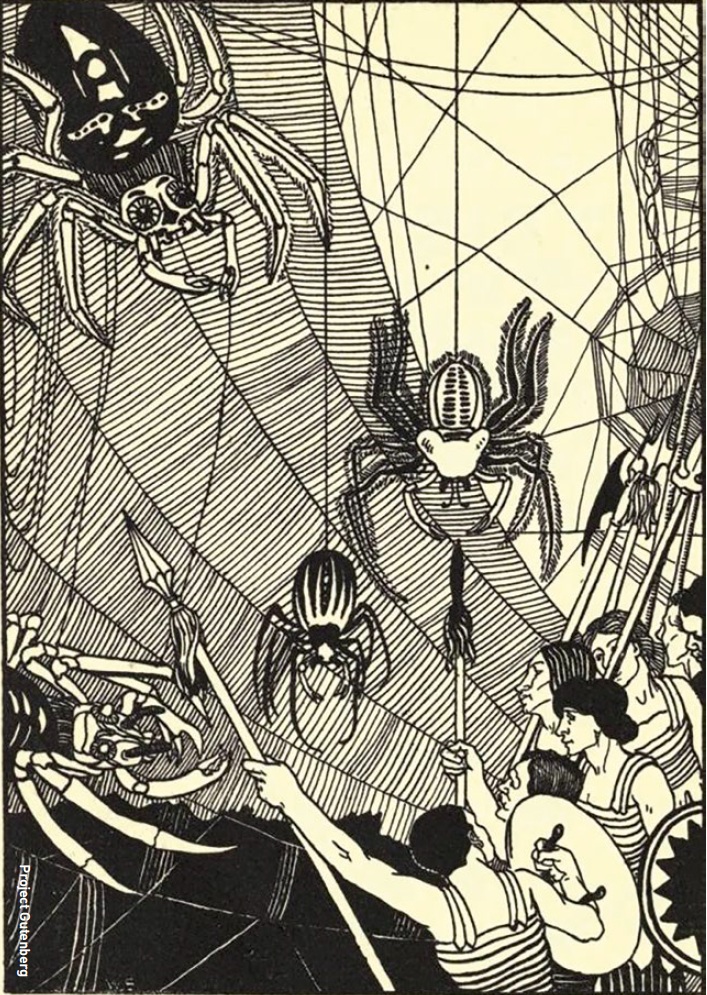 Nineteenth century illustration from Ancient Greek novelist and satirist Lucian of Samosata’s popular book, A True Story, during which a ship’s crew takes an unexpected voyage to the Moon.
Nineteenth century illustration from Ancient Greek novelist and satirist Lucian of Samosata’s popular book, A True Story, during which a ship’s crew takes an unexpected voyage to the Moon.
The final frontier - who gets to decide?
The true challenge of space exploration lies in managing competing interests to ensure it remains a shared and sustainable endeavour
As humanity stands on the threshold of a new space age, Mythologies of Outer Space challenges us to critically examine the narratives that shape our extraterrestrial ambitions. The book underscores that space is not a neutral expanse but a contested terrain where history, ideology, and ethics converge.
Through a multidisciplinary lens, the contributors urge us to rethink our approach to space exploration. Will it be an extension of exploitative colonial practices, or can it become a domain of equitable collaboration? As we look to the stars, the way we answer these questions will determine whether space remains the final frontier – or a new beginning for humanity’s collective imagination.
The book is a thought-provoking and essential read for anyone interested in the intersection of space exploration, culture and ethics. By weaving together scientific, historical and artistic perspectives, it broadens our understanding of how we relate to the cosmos. It invites us to envision a future where space exploration is not just a technological pursuit but a deeply human endeavour – one that reflects our highest ideals rather than our darkest impulses.
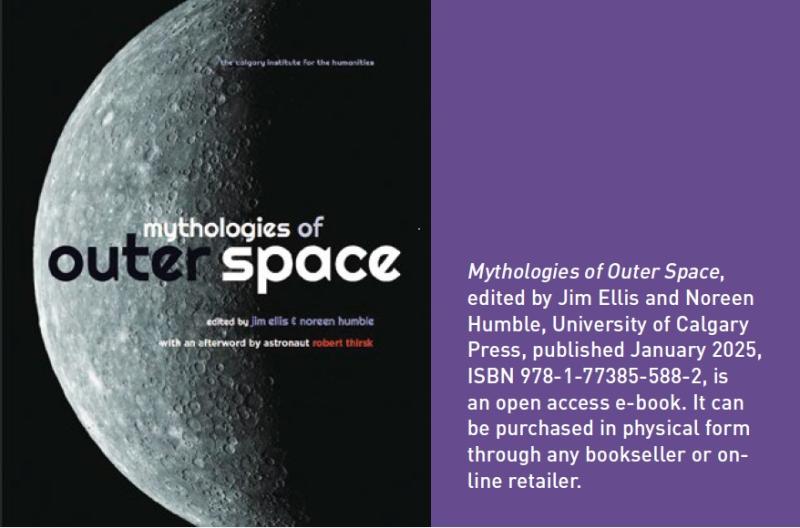
Editor’s note
Mythologies of Outer Space originated from the 42nd Calgary Institute for the Humanities Community Seminar, titled ‘The Last Frontier: Mythologies of Outer Space’. The idea came from the CIH Advisory Board, which includes Heather Bourne, Ron Bond, Jackie Flanagan, David Holub, Amanda Koyama, Tony Luppino, Jim McNeil, Naomi Potter and Nancy Tousley.
About the author
Ariadne Gallardo Figueroa studied communication sciences and has worked extensively across Mexico’s broadcasting industry. She has also worked in ethno-anthropological research and taught muralist and symbolic art workshops to children and in Indigenous communities. Currently she is dedicated to literary work of various kinds and participation in Asgardia the space nation as a parliamentarian.





